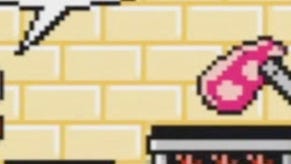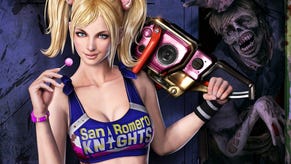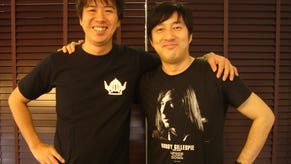No More Heroes
We meant to do that.
It always looks fine, but while Grasshopper's stylised, Killer7-style rendering and versatile character modelling is easy on the eyes, the Wii's overall output generally isn't. There's slowdown throughout Santa Destroy, the edges are so jagged you could cut glass with them and everyone who's walked past my screen this week has ignored the lovely shadows, and Grasshopper's ability to get a lot out of a little in artistic terms, preferring instead to focus on "the Dreamcast visuals". The absence of blood from Rising Star's PAL release also means that your enemies explode in showers of black pixels rather than an Eli Roth ketchup fantasy, but the fact they shower you with coins rather makes up for it.
Where you do the most fighting is in the run-up to boss encounters, which turn out to be very enjoyable. There's no doubt that each of your adversaries is a well-rounded, fascinating bundle of complexes and philosophies, scripted with care and concern, but there's also Suda 51's telltale caricature and absurdity, like a grenade-loving amputee with a rocket launcher for a leg who attacks you by detonating landmines with a spade. Each encounter is preceded by a long stream of henchmen fights (kill these guys, a path opens, kill these guys, a path opens), and rarely is there much more than a thematic allusion to what lies beyond the final door, but the game's knowing construction assists their impact; after half a dozen virtually identical build-ups, a flight along a tunnel with the boss ever-present and just out of reach is interesting, the subsequent encounter in a wind farm is handled with assurance, and a train ride further on is a great white success.
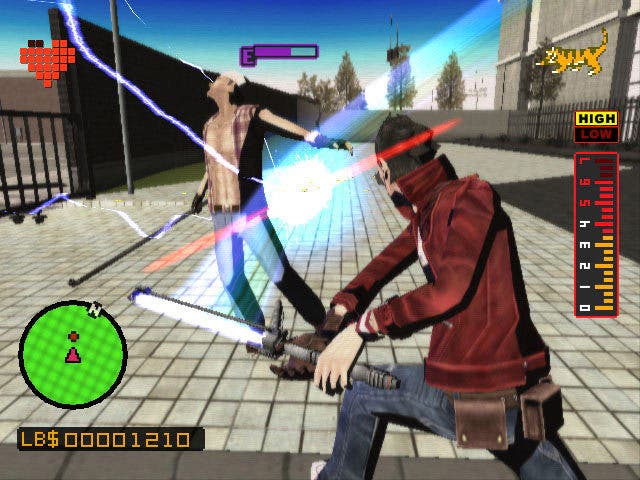
That said, we're not really talking about Metal Gear Solid 3's The Sorrow, or MGS' Psycho Mantis levels of invention. There are times when it comes close - Harvey Moiseiwitsch Volodarskii's Lionel Richie moment springs to mind - but while there's crossover in the voice acting pool, most fights ultimately come down to circling your prey, observing their attack patterns and making sure there's enough juice in your beam katana to withstand the most direct attacks and enough space to evade and then swing into action when you've done your homework. It's the theatricality, rather than the mechanics, of each encounter that delivers it into infamy.
Meanwhile, the manner with which you're delivered into each encounter speaks to the game's wonderful absurdity and gimmicky love of its Nintendo home. Sylvia Christel, the French-sounding blonde who queues up your opposition, is a ruthless tease, and Travis's whole ascent seems to be predicated on the belief that she'll "do" him if he makes it to number one. When she calls you up to announce that you're nearly at the fight, you have to hold the Wiimote up to your ear like a mobile phone to hear her. Which is neat, even if she does talk gibberish.
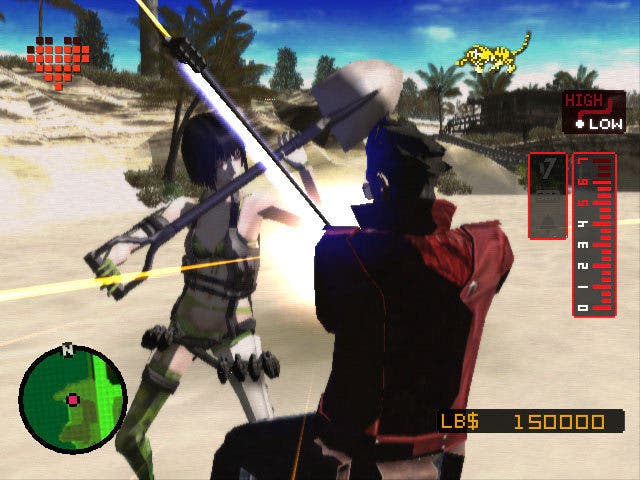
Thinking back on the rest of the game is a blur of smiles: recharging the beam katana by holding the A button and shaking it vigorously as Travis does his part on-screen; the third-rate-job provider's belief structure; the superhero boss with the hand-zapper; the glorious pixellated icons and deliberately useless 8-bit throwback mini-map; saving your game on the toilet; playing with your cat; every screen-wipe, fade and cut, and the shutter effect on view-correction; the video shop phone messages. The music's brilliant, too. As long as you're in one of a few key places - a fight, a shop, a cut-scene or a conversation - you won't be bored. The game's point, to return to where we came in, is that if you're not, then of course you won't be.
The reviewer's point is that in a fight between games as metaphor and games as entertainment, we need to feel like the winners. There are times in No More Heroes when we don't, but there are enough occasions when we do, and by the time you're the best assassin in town you'll either be glad that the destination was always worth it or arguing that it deserves another mark. Either way, you do at least win.

